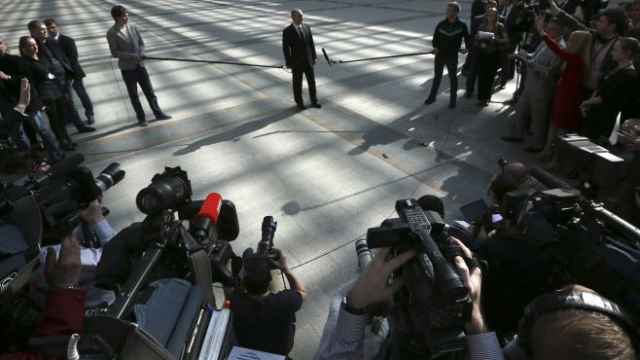Russia said on Monday any U.N. Security Council resolution allowing for the use of force in the Mediterranean to stop gangs smuggling migrants must define the powers of an EU naval mission precisely to win Moscow's backing.
The European Union has agreed a mission to target gangs bringing people from Libya as part of a plan to deal with the influx of migrants to the bloc, but requires a U.N. mandate to be able to intervene in Libyan territorial waters.
Speaking alongside Italian Foreign Minister Paolo Gentiloni, whose country is one of the migrants' most popular destinations, Lavrov was cautious about any resolution that is proposed under Chapter 7 of the U.N. Charter, which allows the use of force to restore international peace and security.
"If such a proposal is made, we will have to write down in the most minute detail the mandate of such a mission under Chapter 7," Lavrov told a joint news conference after talks with Gentiloni. "We don't want a repeat of the ambiguity that was used for gross abuse of the Libya resolution adopted in 2011."
Russia, which has the power of veto as a permanent member of the Security Council, accuses the West of abusing a 2011 resolution authorizing NATO intervention in Libya to help forcibly topple longtime dictator Muammar Gaddafi.
Libya has descended into chaos nearly four years after the fall of Gaddafi, and two competing governments backed by militia brigades are scrambling for control of the oil-producing country, creating havens for Islamist militants and traffickers.
Lavrov said discussions in the Security Council on the new resolution against human traffickers were on hold as the EU was in talks with the internationally-recognized Libyan authorities sitting in Tobruk to work out necessary details.
He said issues included ownership rights in case of the destruction of vessels used by smugglers, choosing a legal jurisdiction that would deal with prosecuting smugglers and securing the rights of illegal migrants.
"We have confirmed our interest in helping solve this problem, including our work in the U.N. Security Council," Lavrov added.
A Message from The Moscow Times:
Dear readers,
We are facing unprecedented challenges. Russia's Prosecutor General's Office has designated The Moscow Times as an "undesirable" organization, criminalizing our work and putting our staff at risk of prosecution. This follows our earlier unjust labeling as a "foreign agent."
These actions are direct attempts to silence independent journalism in Russia. The authorities claim our work "discredits the decisions of the Russian leadership." We see things differently: we strive to provide accurate, unbiased reporting on Russia.
We, the journalists of The Moscow Times, refuse to be silenced. But to continue our work, we need your help.
Your support, no matter how small, makes a world of difference. If you can, please support us monthly starting from just $2. It's quick to set up, and every contribution makes a significant impact.
By supporting The Moscow Times, you're defending open, independent journalism in the face of repression. Thank you for standing with us.
Remind me later.





